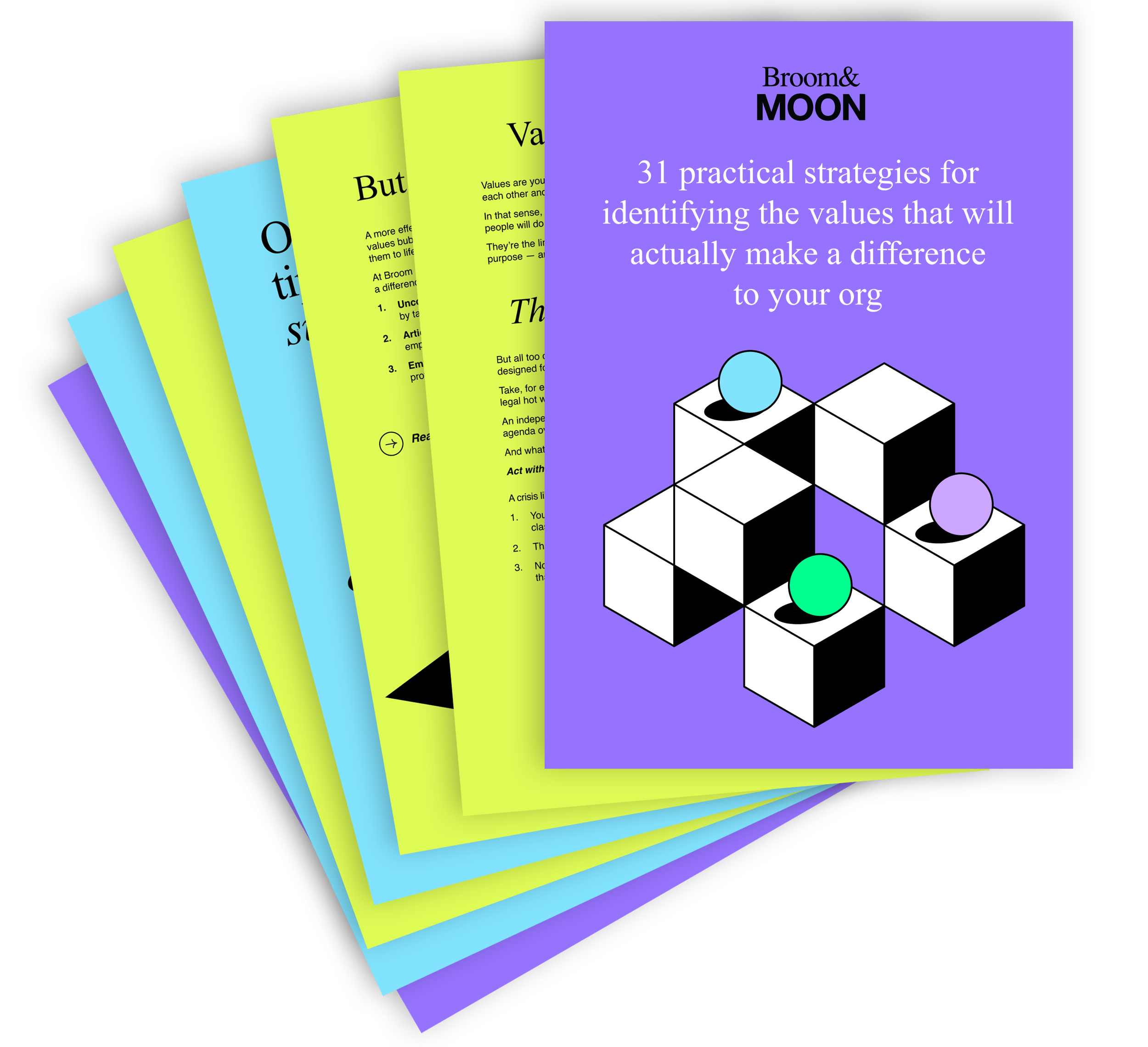This ubiquitous corporate value is a red flag for a culture in trouble
You know you’ve identified your org’s true values if they wouldn’t be right for everyone. Example? Our client whose values were Brave, Smart, Humble and Give a Shit.
Similarly, “Move fast and break things”. Perfect if you’re early-era Facebook. Terrible if you’re an undertaker.
That’s why we always recommend uncovering your true values by talking to your employees. And why we warn against imposing them top-down from the exec team.
Because, all too often, those imposed values will be “table stakes” values. You know: those values that should simply be a given for doing business.
Top of the table-stakes list? Integrity, also found in its less Latinate, more colloquial form Doing the right thing.
The “as-opposed to” test for more authentic values
Like all table-stakes values, integrity/doing the right thing fails what we call the “as opposed to” test.
“Integrity is at the heart of everything we do”?
What? As opposed to having some moral wiggle room in there, as needed?
“We always do the right thing”?
Really? As opposed to sometimes doing the wrong thing if it’s in the interests of the business?
If no one would admit to holding the antithesis of your value, you’re in the territory of the mealy mouthed.
Which is why, whenever we hear of a corporate scandal, our first instinct is always to head to the values section of the beleaguered firm’s website.
More often than not, “integrity” tops the list.
A real-life example of “integrity” gone wrong
Here’s a perfect example of a company espousing its integrity, only to have its reputation trashed after a horrifying scandal:
We DO THE RIGHT THING
Integrity is at our core. We always act in the best interest of our clients, communities and each other. We work collaboratively as a team putting others first. We keep our promises and treat everyone with the respect they deserve. That's what earns trust.
So far, so hard-to-disagree-with.
Until you realise this is from the website of a “trusted wellbeing adviser” that became the subject of a BBC investigation.
Allegedly, the firm allowed its corporate clients to secretly listen in on counselling calls to its helpline so they could see how the service was being run.
The calls, made by the clients’ employees, were, by nature, intensely private. Some were so distressing, even the clients who were secretly listening in needed counselling afterwards.
Now, perhaps the people who allowed this breach of trust to happen genuinely thought they were doing the right thing.
“Working collaboratively” to put the client first.
“Keeping a promise” to go the extra mile for the client.
“Earning trust” by being as helpful as possible to the client.
And when you look at the organisation’s other values, it’s clear that “doing the right thing” meant prioritising the paying client over the distressed employee:
We CARE
We are a people business. Our passion, commitment and dedication comes from our genuine care to help others build great organisations.We TAKE ACTION
The market moves quickly and so do we. Accountable, agile and adaptable - our professional excellence stems from being action-oriented and offering value at every interaction.We INNOVATE
Putting the clients first, we purposefully innovate. We listen understand and turn data into insight to offer meaningful services and systems to our clients.We INFORM
We ensure peace of mind. With our expertise and years as specialists, we're different because we never rest. Our ambition to be the best drives us forward.
Helping others build great organisations. Putting clients first. Moving with the market.
Notice what’s absent? Yep, that’s right: the people calling the helpline.
Even the values you’d expect of a counselling service — being caring and informative — are interpreted in the light of managing relationships with the corporate client. Oof.
The lessons
So what can we learn from this example?
First of all, doing the right thing isn’t always as straightforward as a bunch of nice-sounding words on a website might suggest.
Acting with integrity might require you to take unpopular decisions. It can — and probably should — demand that you make difficult choices between competing interests. Like the interests of the client who pays your bills versus the interests of their employee using your service.
A great set of values will help your own employees make those difficult decisions even when you’re not there to guide them.
But mealy-mouthed table-stakes values that everyone knows are just “words on a wall” will have zero effect on your culture or employee behaviours.
A better approach is to have a company-wide conversation about what your people really value — and what they see as valued by those around them.
Even better if it includes frank discussions about how those values play out in the trickiest decisions employees may face.
In this example, many of the employees themselves knew what was going on — and told the BBC they had grave concerns about it.
An honest, company-wide conversation about the company’s true values may have uncovered the failures before the BBC did.
Want to kickstart a conversation with employees to uncover your org’s authentic values? Book a time to chat to us!


